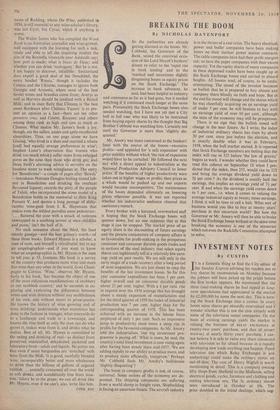BREAKING THE BOOM
By NICHOLAS DAVENPORT So the authorities are already getting alarmed at the boom. Mr. Cobbold, the Governor of the Bank, seized the convivial occa- sion of the Lord Mayor's bankers' dinner to refer to the 'rapid rise in bank lending' and to the 'marked and sometimes slightly disquieting boom in equity prices on the Stock Exchange.' The increase in bank advances, he said, had been helpful to industry and commerce as far as it had gone, but it needed watching if _it continued much longer at the same pace. Presumably the Stock Exchange boom also needed watching, but I have not yet met a City bull in full roar who was likely to be restrained from buying equity shares by the thought that Big Brother Cobbold was watching him. Certainly not until the Governor is more than 'slightly dis- quieted.'
Mr. Amory was more concerned at the bankers' feast with the source of the boom—excessive profits—and appealed for 'a safe expansion' with price stability without which 'the rate of expansion would have to be curtailed.' He followed the next day with a direct appeal to industrialists at the National Production Advisory Council to lower prices. If the benefits of higher productivity were taken out in higher wages or profits, then prices as a whole would be pushed up and our exports would become uncompetitive. The maintenance of the boom depended ultimately on lowering prices wherever possible. It was not reported whether his industrialist audience cheered that cautionary remark.
Every broker with a harassed, overworked staff is hoping that the Stock Exchange boom will quieten down, but no one supposes that at this
stage it can be stopped. The market price of an equity share is the discounting of future earnings
and the present conjuncture of company affairs is so favourable for profit-making in the prosperous consumer and consumer durable goods trades and in sections of the steel industry that select equity shares can legitimately sell at a relatively low earn- ings yield on past results. We are still only in the early stages of a trade recovery after a long period of semi-stagnation. We are just about to reap the benefits of the last investment boom. So far this year consumer' expenditure has been 5 per cent.
higher overall and on consumer durable goods about 25 per cent. higher. With a 4 per cent. rise in exports over the 1958 average this has brought about a steady expansion of manufactures and for the third quarter of 1959 the index of industrial production was 7 per cent. higher than for the corresponding quarter of 1958. This has been achieved with an increase in the labour force employed of only 1 per cent. Such an impressive jump in productivity must mean a steep rise in profits for the favoured companies. As Mr. Amory told the industrialists, 'our big investment pro- gramme is paying off.' What is more, he said, the country's total fixed investment is now rising again after having been steady since mid-1957. 'We are adding rapidly to our ability to produce more, and to produce more efficiently, tomorrow.' Perhaps Mr.' Cobbold finds Mr. Amoly's bullishness `slightly disquieting'?
The boost in company profits is 'not, of course, universal. Some sectors of the economy are de- pressed. The shipping companies are suffering from a world slump in freight rates. Shipbuilding is facing an uncertain future. The aircraft industry is in the throes of a real crisis. The heavy electrical, power and boiler companies have been making losses on their nuclear power station contracts. The cable companies have had their profit margins cut; so have the paper companies with their excess capacity. Yet the equity shares of many companies in these depressed trades' have been caught up in the Stock Exchange boom and carried to absurd heights. All booms tend, 'of course, to be undis- criminating. The mood of the investor becomes so bullish that he is prepared to buy almost any company share blindly on faith and hope. But in the end his mood will change and the shares which he was cheerfully acquiring on an earnings yield of under 5 per cent. he will hesitate to buy with an earnings yield of over 10 per cent., although the state of the economy may still be prosperous.
There is no sign that the bullish mood will change in the near future. As I write, the index of industrial ordinary shares has risen by about 20 per cent. since just before the election, and is exactly double what it was in February, 1958, when the bull market started. It is reported that Stock Exchange members are betting that the index will rise to 325 before 'the law of gravity' begins to work. I wonder whether they could have read this column on September 18 when I pre- dicted that the index, then 255, would rise to 323 and bring the average dividend yield down to 31 per cent.? As the dividend is usually half the earnings, this implies an earnings yield of 71 per cent. If and when the earnings yield comes down to 5 per cent., i.e. when it comes to valuing the average industrial equity at twenty times earnings, I think it will be time to call a halt. What sort of business would you like to buy at twenty years' purchase in this uncertain world? But how the Governor or Mr. Amory will then be able to brake the Stock Exchange boom without at the same time breaking the economy is one of the mysteries which not even the Radcliffe Committee attempted to solve.






































































 Previous page
Previous page